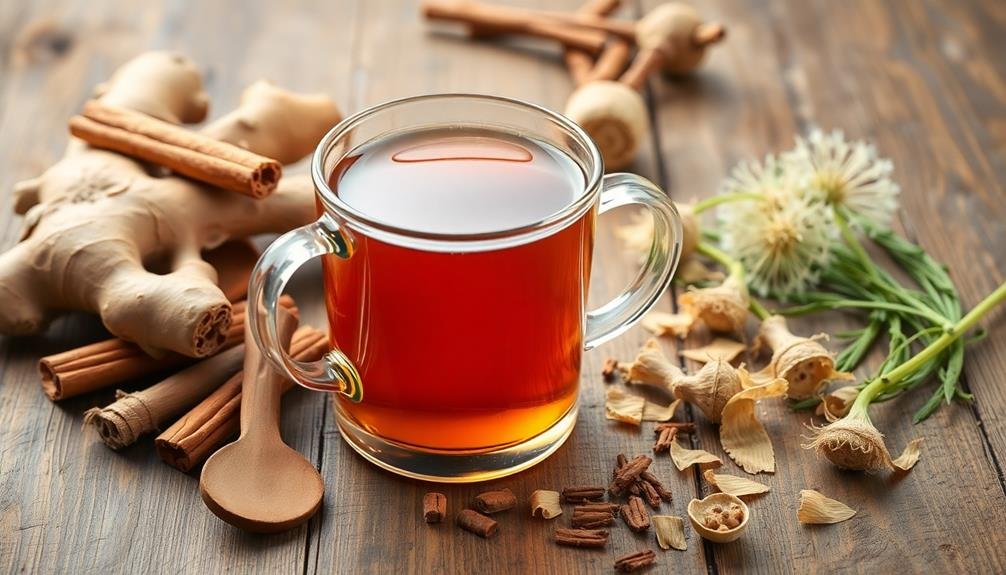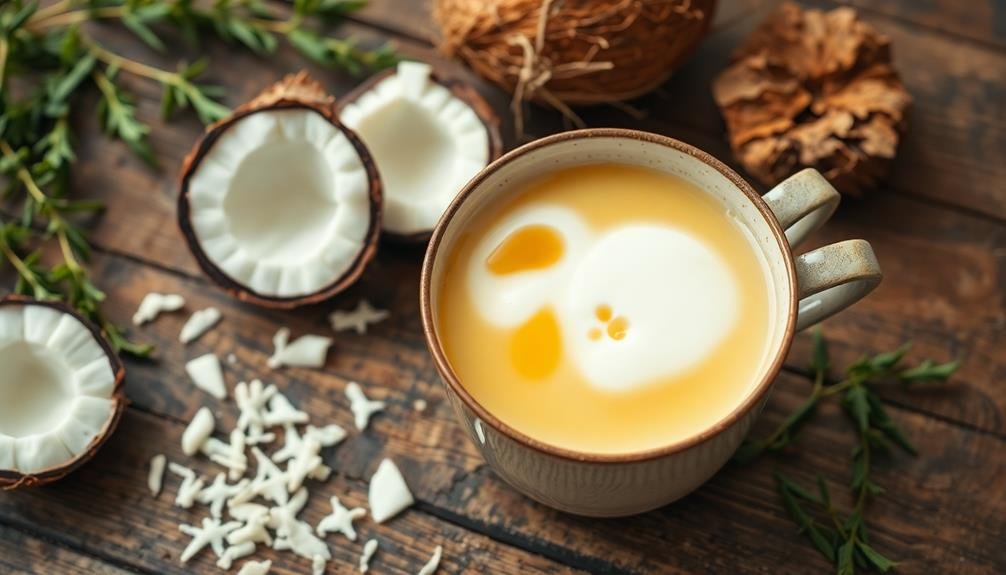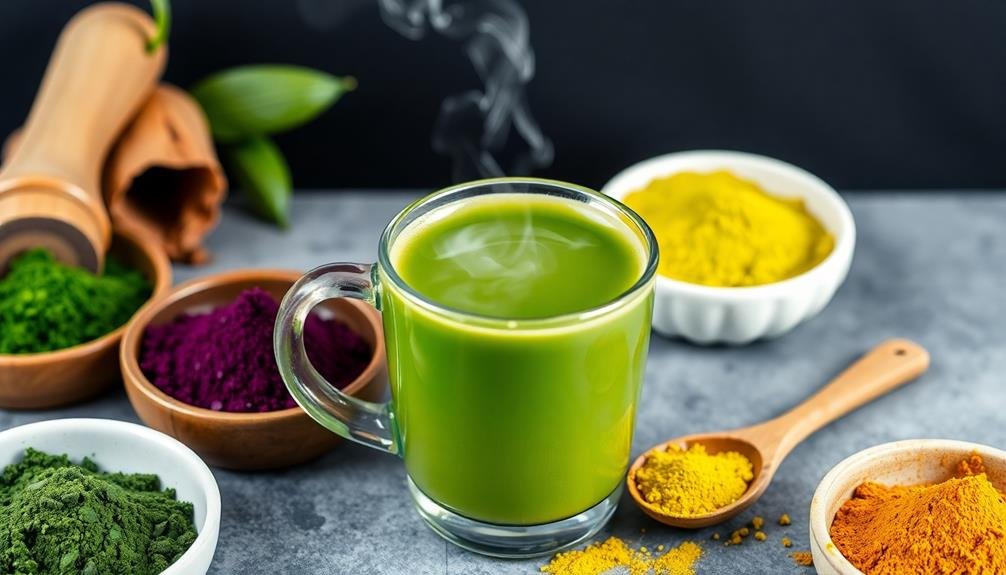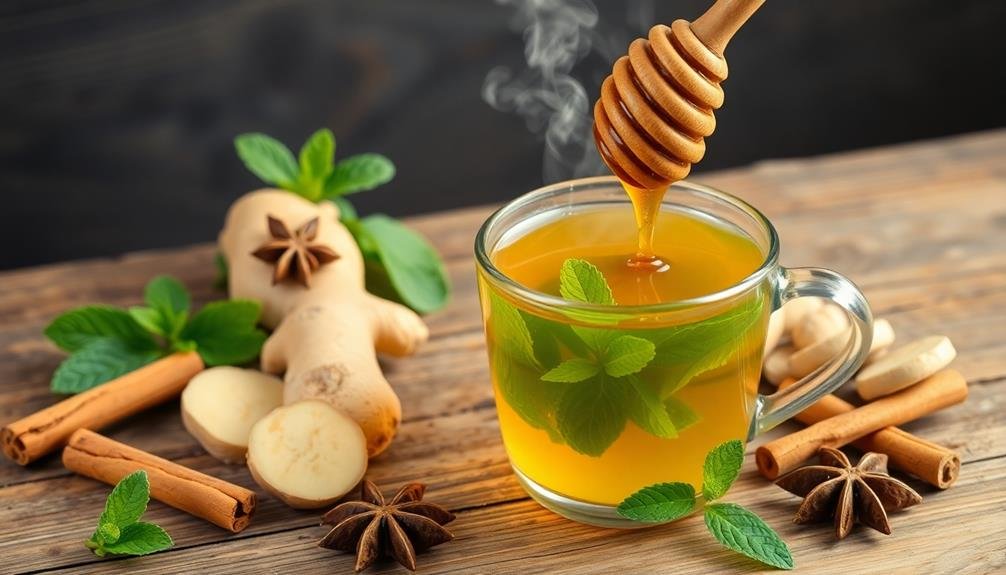Transform your herbal tea into a sensory delight with natural flavor boosters. Add zesty citrus peels, fresh herbs like mint or lavender, and warming spices such as cinnamon or ginger. Enhance sweetness and nutrition with berries or dried fruits, while edible flowers create visual appeal. For richness, try nuts, seeds, or a splash of coconut milk. Vanilla beans infuse aromatic sweetness, and superfood powders like matcha or cacao offer unique profiles. Don't forget the power of essential oils for enticing aromas. With these simple additions, you'll elevate your tea-drinking experience to new heights. Discover a world of flavor possibilities waiting to be explored.
Citrus Zest and Peels

A burst of sunshine in your cup awaits with citrus zest and peels. These vibrant additions can transform your herbal tea into a revitalizing, aromatic experience. Citrus fruits like lemons, limes, oranges, and grapefruits offer a wealth of flavor possibilities.
To use zest, gently scrape the outer layer of the fruit's peel using a zester or fine grater. Be careful to avoid the bitter white pith beneath. Add a pinch of zest to your tea for a subtle citrusy note. For a stronger flavor, try adding thin strips of peel directly to your brew.
You can experiment with different citrus combinations to create unique flavor profiles. Lemon zest pairs well with chamomile for a soothing blend, while orange peel complements earthy teas like rooibos. Grapefruit zest can add a tangy kick to green tea, and lime zest works wonders with mint-based infusions.
Don't discard your citrus peels after juicing. Dry them naturally or in a low-temperature oven, then store in an airtight container. You'll have a ready supply of flavor boosters for your herbal teas whenever inspiration strikes.
Fresh Herbs and Aromatics
While citrus zest adds a zesty kick, fresh herbs and aromatics offer a whole new dimension to your herbal tea experience. You'll find that incorporating these natural ingredients can transform your brew into a fragrant and flavorful delight.
Start by experimenting with classic herbs like mint, which pairs well with green and black teas, or lavender for a soothing, floral touch. Rosemary and thyme can add a savory note to earthy teas, while basil complements fruit-based blends.
Don't overlook the power of aromatics. Fresh ginger root can bring warmth and spice to your tea, while lemongrass offers a subtle citrusy flavor without the acidity. For a unique twist, try adding a few leaves of sage or a sprig of fennel.
Remember to use these ingredients sparingly at first, as their flavors can be potent. You can either steep them directly in your tea or muddle them gently before adding hot water. As you become more familiar with different combinations, you'll develop your own signature blends.
Fresh herbs and aromatics not only enhance the taste of your tea but also provide additional health benefits, making your cup even more rewarding.
Spices for Warmth and Depth

Spices can transform your herbal tea into a cozy, comforting experience.
You'll find cinnamon adds a warm, sweet touch that's perfect for chilly days, while ginger provides a zesty kick that invigorates your senses.
Don't overlook cardamom, which brings an exotic, aromatic quality that elevates your tea to new heights.
Cinnamon's Cozy Comfort
When you're seeking warmth and depth in your herbal tea, cinnamon stands out as a classic choice. This versatile spice adds a sweet, woody flavor that instantly transforms your brew into a cozy cup of comfort.
You'll find that cinnamon pairs exceptionally well with a variety of herbal teas, including chamomile, rooibos, and peppermint.
To incorporate cinnamon into your tea, you have several options. Add a cinnamon stick to your cup while steeping for a subtle infusion, or use ground cinnamon for a more pronounced flavor.
If you're using loose leaf tea, try mixing in a pinch of ground cinnamon before brewing. For a stronger taste, steep a cinnamon stick along with your tea leaves.
Cinnamon not only enhances flavor but also offers potential health benefits. It's known for its antioxidant properties and may help regulate blood sugar levels.
When selecting cinnamon, opt for Ceylon cinnamon if possible, as it's considered safer for regular consumption compared to Cassia cinnamon.
Experiment with different amounts to find your perfect balance of warmth and spice in your herbal tea.
Ginger's Zesty Kick
For those seeking a bold and invigorating addition to their herbal tea, ginger offers an unparalleled zesty kick. This pungent root brings a warming sensation and a spicy flavor profile that'll wake up your taste buds.
When you're looking to add depth and complexity to your herbal brew, ginger is a versatile choice that pairs well with a variety of tea bases.
To incorporate ginger into your tea routine, try these methods:
- Fresh ginger slices: Add a few thin slices to your cup for a subtle, fresh flavor.
- Dried ginger pieces: Steep alongside your tea leaves for a more intense taste.
- Ginger powder: Sprinkle a small amount into your brewed tea and stir well.
- Candied ginger: Drop a piece into your cup for a sweet and spicy twist.
Ginger's benefits extend beyond flavor enhancement. It's known for its potential to aid digestion, reduce inflammation, and boost immunity.
Whether you're fighting off a cold or simply craving a zesty pick-me-up, ginger's spicy warmth can transform your herbal tea into a comforting and invigorating experience.
Cardamom's Aromatic Allure
As you explore the world of herbal tea enhancements, you'll discover cardamom's aromatic allure. This versatile spice adds a complex, slightly sweet flavor with hints of mint and citrus to your brew. Cardamom's unique taste profile can transform a simple herbal tea into a luxurious, fragrant experience.
To incorporate cardamom into your tea, you've got options. Add a few crushed cardamom pods directly to your teapot or infuser, allowing them to steep alongside your chosen herbs. Alternatively, grind the seeds and sprinkle a pinch into your cup before pouring hot water. For a more intense flavor, try steeping whole cardamom pods in hot water for a few minutes before adding your tea leaves.
Cardamom pairs exceptionally well with black teas, chai blends, and herbal infusions like chamomile or rooibos. It's also a perfect complement to other spices like cinnamon, ginger, and cloves. Experiment with different combinations to find your ideal balance.
Beyond its delightful taste, cardamom offers potential health benefits. It's known for its digestive properties and may help freshen breath.
Berries and Dried Fruits
Nothing quite enhances the flavor of herbal tea like the addition of berries and dried fruits. These natural sweeteners bring a burst of vibrant flavors and a hint of tartness to your brew. You'll find that they not only improve taste but also boost the nutritional value of your tea.
When selecting berries and dried fruits for your tea, consider these options:
- Goji berries: Rich in antioxidants, they add a subtle sweetness and earthy undertones.
- Dried cranberries: Offer a tangy kick and complement floral herbal blends beautifully.
- Dried blueberries: Provide a mild, sweet flavor and pair well with citrusy teas.
- Rose hips: Bring a tart, fruity taste and are packed with vitamin C.
To incorporate these flavor boosters, simply add a small handful to your tea infuser along with your chosen herbs. Allow them to steep together, and you'll create a delightful fusion of flavors.
You can also experiment with different combinations to find your perfect blend. Don't be afraid to mix and match berries and dried fruits with other natural additives like spices or citrus peels for an even more complex flavor profile.
Edible Flowers for Visual Appeal

Beyond flavor enhancement, edible flowers can transform your herbal tea into a visual masterpiece. These delicate blooms add a touch of elegance and whimsy to your cup, making it Instagram-worthy and elevating your tea-drinking experience.
Popular edible flowers for herbal tea include chamomile, lavender, rose petals, and hibiscus. Each offers a unique flavor profile and stunning visual appeal. Calendula petals bring a vibrant orange hue, while blue cornflowers provide a striking contrast. For a subtle floral note, try adding jasmine or elderflowers.
When using edible flowers, confirm they're organic and free from pesticides. You can add them directly to your tea infuser or sprinkle them on top of your brewed tea. Dried flowers work well, but fresh petals can offer a more intense aroma and color.
Experiment with different combinations to create your signature blend. Try pairing rose petals with green tea for a romantic twist, or add lavender to chamomile for a soothing nighttime beverage.
Natural Sweeteners and Syrups
When it comes to natural sweeteners for your herbal tea, you can't go wrong with raw honey.
You'll find that raw honey not only adds sweetness but also provides potential health benefits, including antioxidants and antibacterial properties.
If you're feeling adventurous, try making your own fruit syrups at home using fresh berries or stone fruits for a vibrant, natural flavor boost.
Raw Honey Benefits
While many sweeteners can enhance your herbal tea, raw honey stands out as a natural powerhouse of benefits.
It's not just a sweetener; it's a nutrient-rich substance that can complement your herbal brew in numerous ways. Raw honey, unlike processed varieties, retains its natural enzymes, antioxidants, and beneficial compounds.
When you add raw honey to your herbal tea, you're not only sweetening your drink but also boosting its health properties.
Here's why you should consider raw honey for your next cup:
- Antioxidant boost: Raw honey contains flavonoids and phenolic acids that fight free radicals in your body.
- Soothing properties: It can help calm a sore throat and suppress coughs, making it perfect for herbal teas aimed at cold relief.
- Digestive aid: Raw honey may promote the growth of good gut bacteria, supporting digestive health.
- Natural energy source: Its natural sugars provide a quick, sustained energy boost without the crash associated with refined sugars.
Remember to add raw honey to your tea after it's cooled slightly to preserve its beneficial properties.
Start with a small amount and adjust to taste, as raw honey's flavor can be quite potent.
Homemade Fruit Syrups
After exploring the benefits of raw honey, let's plunge into the world of homemade fruit syrups. These vibrant, flavorful concoctions can elevate your herbal tea experience while offering a natural sweetness alternative.
To create your own fruit syrup, start by selecting ripe, in-season fruits. Berries, peaches, and citrus work exceptionally well. Combine equal parts fruit and sugar in a saucepan, adding a splash of water.
Simmer the mixture over low heat, stirring occasionally until the fruit breaks down and the syrup thickens. Strain the mixture through a fine-mesh sieve, and store it in an airtight container in the refrigerator.
You'll find that homemade fruit syrups offer a more intense, authentic flavor compared to store-bought versions. They're free from artificial preservatives and allow you to control the sweetness level.
Experiment with different fruit combinations or add herbs like mint or basil for unique flavor profiles. A teaspoon or two of your homemade syrup can transform a plain herbal tea into a luxurious, fruity delight.
Plus, you can use these versatile syrups in cocktails, desserts, or as toppings for pancakes and yogurt.
Roots and Barks

Nature's hidden treasures lie beneath the soil and behind tree bark, offering a wealth of flavors for your herbal tea. Roots and barks add depth, earthiness, and sometimes surprising sweetness to your brew. You'll find these ingredients can transform a simple tea into a complex, satisfying experience.
When using roots and barks, remember to clean them thoroughly and chop or grate them finely for ideal flavor extraction. Steep these robust ingredients for longer periods, often 10-15 minutes, to fully release their essence.
Here are four popular roots and barks to experiment with:
- Ginger root: Adds a spicy, warming kick
- Cinnamon bark: Provides a sweet, comforting flavor
- Licorice root: Offers natural sweetness and soothing properties
- Sassafras root bark: Imparts a unique, root beer-like taste
Don't be afraid to combine these with other herbs or fruits for custom blends. Start with small amounts and adjust to your taste preferences.
You'll soon discover that roots and barks can become the foundation of your most cherished herbal tea creations, elevating your daily cup to new heights of flavor and enjoyment.
Essential Oils for Aroma
Essential oils offer a powerful way to enhance the aroma of your herbal tea, creating a multi-sensory experience that delights both your taste buds and nose. These concentrated plant extracts can transform a simple cup of tea into a luxurious, aromatic treat. To use essential oils in your tea, add just a drop or two to your cup after brewing, as they're extremely potent.
Here's a guide to some popular essential oils and their complementary tea pairings:
| Essential Oil | Tea Pairing |
|---|---|
| Lavender | Chamomile |
| Peppermint | Green Tea |
| Lemon | Black Tea |
| Rose | White Tea |
When selecting essential oils, always choose high-quality, food-grade options. Be cautious with dosage, as excessive use can overpower your tea's natural flavors or cause adverse reactions. Remember that essential oils aren't water-soluble, so you'll need to stir your tea well before drinking. For a subtler approach, try adding a drop of oil to your teapot or infuser before brewing. This method allows the aroma to infuse gently into your tea without altering its taste considerably.
Fruit Juices and Extracts

Bursting with natural sweetness and vibrant flavors, fruit juices and extracts offer an excellent way to enhance your herbal tea. They can transform a simple brew into a rejuvenating and complex beverage that tantalizes your taste buds.
When selecting fruit juices or extracts, opt for pure, unsweetened varieties to maintain control over the sugar content and guarantee a genuine fruit flavor.
To incorporate fruit juices and extracts into your herbal tea, try these methods:
- Add a splash of fresh-squeezed citrus juice (lemon, lime, or orange) to brighten the flavor profile.
- Mix in a few drops of berry extract (strawberry, raspberry, or blueberry) for a subtle fruity note.
- Blend in some pomegranate or cherry juice for a rich, tart undertone.
- Use apple or pear juice to create a naturally sweet base for your herbal blend.
Remember to start with small amounts and adjust to taste.
You'll find that different fruit flavors complement specific herbs beautifully. For example, lemon pairs well with chamomile, while berry extracts enhance the taste of hibiscus tea.
Experiment with various combinations to discover your perfect fruit-infused herbal tea creation.
Nuts and Seeds
Nuts and seeds offer a unique twist to your herbal tea, adding depth and richness to the flavor profile. You can incorporate these ingredients in various ways to enhance your brew. Try adding a few crushed almonds or hazelnuts to your tea infuser for a subtle nutty undertone.
Alternatively, you can steep whole nuts directly in hot water before adding your tea leaves. For a more intense flavor, toast nuts or seeds before adding them to your tea. This process releases their natural oils and intensifies their taste.
Experiment with sesame seeds, pumpkin seeds, or even sunflower seeds for different flavor combinations. You'll find that some nuts and seeds pair particularly well with specific herbal teas. For instance, walnuts complement chamomile tea, while pumpkin seeds enhance the earthy notes of rooibos.
Don't forget about nut and seed butters. A small dollop of almond or cashew butter can create a creamy, indulgent tea experience. You can also try infusing your tea with coconut flakes for a tropical twist.
Remember to strain your tea thoroughly if you've added whole nuts or seeds to avoid any unwanted texture in your final brew.
Coconut Flakes and Milk

Coconut flakes and milk bring a tropical flair to your herbal tea, offering a creamy texture and sweet, nutty flavor. You'll find that adding these coconut elements can transform your ordinary herbal brew into a luxurious, indulgent experience.
When using coconut flakes, sprinkle them on top of your tea just before serving to preserve their crunch and release their aromatic oils. For a richer taste, try steeping the flakes directly in hot water before adding your tea leaves.
Coconut milk, on the other hand, can be used as a dairy-free alternative to regular milk or cream. It's particularly delightful when paired with spicy chai blends or fruity herbal infusions.
To incorporate coconut milk into your tea routine, consider these options:
- Replace half of the water with coconut milk when brewing
- Add a splash of coconut milk after steeping for a creamy finish
- Create a coconut milk foam to top your tea
- Blend coconut milk with your tea and ice for a revitalizing iced latte
Experiment with different ratios and combinations to find your perfect coconut-infused herbal tea.
You'll discover that these tropical additions can elevate your tea-drinking experience, making each sip a mini-vacation for your taste buds.
Vanilla Bean and Pods
You'll love how vanilla bean and pods can add natural sweetness to your herbal tea without the need for sugar.
To infuse your tea with vanilla's aromatic essence, simply split a pod lengthwise and steep it alongside your tea leaves.
For a more intense flavor, you can scrape the seeds directly into your brew or create a vanilla-infused simple syrup to add later.
Sweetness Without Sugar
Vanilla bean and pods offer a natural way to add sweetness to your herbal tea without relying on sugar.
They're not only delicious but also packed with antioxidants and anti-inflammatory properties. To use vanilla in your tea, simply add a small piece of the bean or a whole pod to your brew and let it steep. The longer it steeps, the more intense the flavor becomes.
If you're looking for alternatives to vanilla or want to explore other sugar-free sweetening options, consider these natural flavor boosters:
- Stevia leaves: These naturally sweet leaves can be added directly to your tea or used in dried form.
- Licorice root: Known for its natural sweetness, it also offers potential health benefits.
- Cinnamon sticks: They add warmth and a subtle sweetness to your brew.
- Dried fruit: Options like apple slices or berries can infuse your tea with natural sugars.
Aromatic Infusion Techniques
Enhancing your herbal tea with aromatic infusions can transform a simple brew into a complex and luxurious experience. Vanilla bean and pods are excellent choices for adding depth and warmth to your tea. To use vanilla, split a bean lengthwise and scrape out the seeds. Add both the seeds and the pod to your tea as it steeps. You'll notice a rich, sweet aroma that complements many herbal blends.
For a more intense flavor, try infusing vanilla in hot water separately before adding it to your tea. This method allows you to control the strength of the vanilla essence. You can also create a vanilla-infused simple syrup by simmering vanilla beans in water and a natural sweetener of your choice.
Don't discard used vanilla pods; they can be dried and used to scent sugar or added to future tea blends for a subtle flavor boost.
When storing vanilla beans, keep them in an airtight container in a cool, dark place to maintain their potency. Remember, a little goes a long way with vanilla, so start with small amounts and adjust to your taste preferences.
Superfood Powders and Blends

In recent years, superfood powders and blends have become popular additions to herbal teas, offering both flavor and nutritional benefits. These potent ingredients can transform your regular herbal brew into a powerhouse of nutrients and antioxidants.
When selecting superfood powders for your tea, consider options like matcha, cacao, maca, or spirulina. Each brings its unique flavor profile and health benefits to your cup.
To incorporate superfood powders into your herbal tea routine:
- Start with a small amount: Begin with 1/4 to 1/2 teaspoon per cup of tea and adjust to taste.
- Mix thoroughly: Use a small whisk or frother to guarantee the powder dissolves completely.
- Experiment with combinations: Try blending different superfood powders for complex flavors and enhanced benefits.
- Consider temperature: Some powders may be sensitive to heat, so add them after brewing your tea.
When choosing superfood blends, look for high-quality, organic options without added sugars or artificial ingredients.
You'll find pre-made blends targeting specific health goals, such as immune support or energy boost. Remember, while these powders can enhance your tea experience, they shouldn't replace a balanced diet.
Enjoy exploring the world of superfood-infused herbal teas and discover your favorite combinations.
Frequently Asked Questions
Can I Reuse Flavor Boosters for Multiple Cups of Tea?
You can often reuse flavor boosters for multiple cups of tea. However, the intensity will diminish with each use. For the best flavor, you'll want to use fresh boosters each time you brew a new cup.
How Long Should I Steep Herbal Tea With Added Flavor Enhancers?
You'll want to steep your herbal tea with flavor enhancers for 5-7 minutes. This allows enough time for the flavors to fully infuse. Don't oversteep, as it can make your tea bitter or overpowering.
Are There Any Flavor Combinations to Avoid When Boosting Herbal Tea?
You'll want to avoid mixing strong, conflicting flavors. Don't pair bitter herbs with sour citrus, or combine too many intense spices. It's best to stick with complementary flavors that enhance, rather than overpower, your base tea.
Can I Add Flavor Boosters to Pre-Bagged Herbal Teas?
Yes, you can add flavor boosters to pre-bagged herbal teas. Simply steep your tea bag as usual, then add your chosen boosters. You'll enhance the flavor and create unique combinations tailored to your taste preferences.
What's the Best Way to Store Homemade Herbal Tea Blends?
Store your homemade herbal tea blends in airtight containers away from light, heat, and moisture. You'll want to keep them in a cool, dark place like a pantry. Don't forget to label them with the date and ingredients.
In Summary
You've now got a treasure trove of natural flavor boosters to elevate your herbal tea experience. Don't be afraid to experiment and mix these ingredients to create your own unique blends. Remember, it's all about finding what you enjoy most. Whether you're seeking comfort, health benefits, or just a delicious cup, these additions will transform your tea into something truly special. So go ahead, get creative, and sip your way to tea perfection!





Leave a Reply